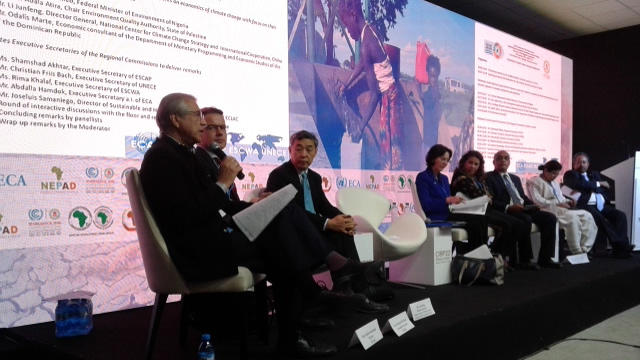ECLAC Presents at COP 22 its Proposal for an Environmental Big Push to Change Production and Consumption Patterns
Topic(s)
A delegation from the United Nations regional body participated today in various gatherings in the framework of the 22nd Conference of the Parties that is being held in Marrakech.

At COP 22 today, the Economic Commission for Latin America and the Caribbean (ECLAC) put forth its proposal for the region’s countries to give an environmental big push to their economies, with the aim of changing current production and consumption patterns and establishing a sustainable development path that allows them to confront climate change.
Two events organized by the United Nations regional commissions were held this Tuesday in the context of the 22nd Conference of the Parties (COP) to the United Nations Framework Convention on Climate Change (UNFCCC), which is taking place on November 7-18 in Marrakech (Morocco). The Director of the Sustainable Development and Human Settlements Division, Joseluis Samaniego, represented ECLAC in both instances.
Other participants included the Executive Secretaries of the Economic Commission for Europe (UNECE), Christian Friis Bach; of the Economic and Social Commission for Western Asia (ESCWA), Rima Khalaf; and of the Economic and Social Commission for Asia and the Pacific (ESCAP), Shamshad Akhtar; as well as the acting Executive Secretary of the Economic Commission for Africa (ECA), Abdalla Hamdok.
In the first of these events, entitled Advancing the 2030 Agenda through climate action: Integrated solutions for regional implementation, ECLAC’s representative sustained that climate change is linked to the existence of unsustainable production and consumption patterns, based on intensive fossil fuel use, which means these models must be changed to provide solutions to this phenomenon.
In the second gathering, focused on the Economics of Climate Change: Regional perspectives, Joseluis Samaniego explained that ECLAC, in its latest position document entitled Horizons 2030: Equality at the centre of sustainable development, proposed an environmental big push via investments in strategic sectors to reactivate growth and promote a low-carbon development path.
This proposal, he said, should also contemplate public policy options such as the elimination of subsidies that are harmful to the environment, the modification of relative prices to make more expensive what is least sustainable, the provision of quality public services, and the search for solutions to reduce congestion and pollution in cities.